2014年全国高考英语试题分类汇编 虚拟语气 情态动词(含解析)
- 格式:doc
- 大小:105.00 KB
- 文档页数:8
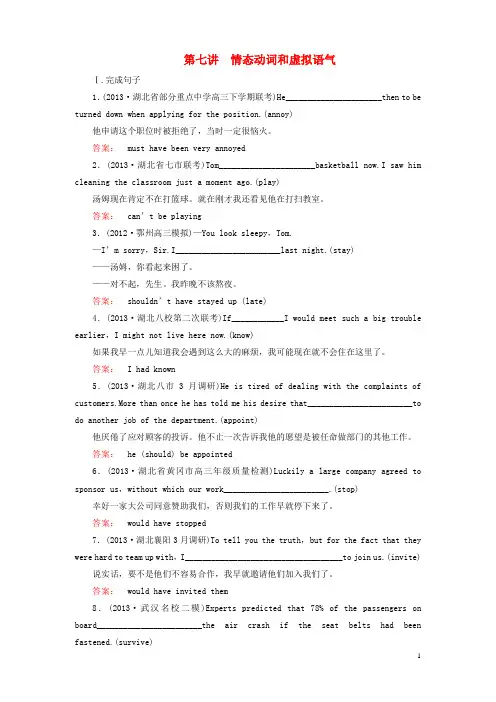
第七讲情态动词和虚拟语气Ⅰ.完成句子1.(2013·湖北省部分重点中学高三下学期联考)He______________________then to be turned down when applying for the position.(annoy)他申请这个职位时被拒绝了,当时一定很恼火。
答案:must have been very annoyed2.(2013·湖北省七市联考)Tom______________________basketball now.I saw him cleaning the classroom just a moment ago.(play)汤姆现在肯定不在打篮球。
就在刚才我还看见他在打扫教室。
答案:can’t be playing3.(2012·鄂州高三模拟)—You look sleepy,Tom.—I’m sorry,Sir.I________________________last night.(stay)——汤姆,你看起来困了。
——对不起,先生。
我昨晚不该熬夜。
答案:shouldn’t have stayed up (late)4.(2013·湖北八校第二次联考)If____________I would meet such a big trouble earlier,I might not live here now.(know)如果我早一点儿知道我会遇到这么大的麻烦,我可能现在就不会住在这里了。
答案:I had known5.(2013·湖北八市3月调研)He is tired of dealing with the complaints of customers.More than once he has told me his desire that________________________to do another job of the department.(appoint)他厌倦了应对顾客的投诉。
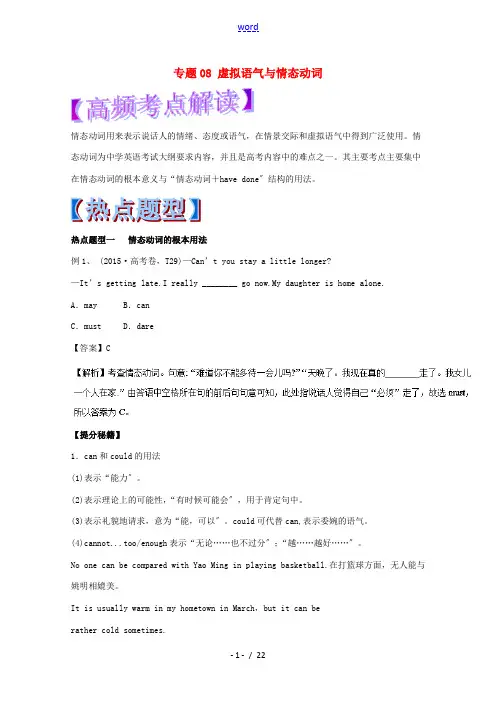
专题08 虚拟语气与情态动词情态动词用来表示说话人的情绪、态度或语气,在情景交际和虚拟语气中得到广泛使用。
情态动词为中学英语考试大纲要求内容,并且是高考内容中的难点之一。
其主要考点主要集中在情态动词的根本意义与“情态动词+have done〞结构的用法。
热点题型一情态动词的根本用法例1、(2015·高考卷,T29)—Can’t you stay a little longer?—It’s getting late.I really ________ go now.My daughte r is home alone.A.may B.canC.must D.dare【答案】C【提分秘籍】1.can和could的用法(1)表示“能力〞。
(2)表示理论上的可能性,“有时候可能会〞,用于肯定句中。
(3)表示礼貌地请求,意为“能,可以〞。
could可代替can,表示委婉的语气。
(4)cannot...too/enough表示“无论……也不过分〞;“越……越好……〞。
No one can be compared with Yao Ming in playing basketball.在打篮球方面,无人能与姚明相媲美。
It is usually warm in my hometown in March,but it can berather cold sometimes.我的家乡三月份通常很暖和,但有时候也会相当冷。
You can’t be too careful while driving.开车时越小心越好。
—Could I use your bike tomorrow?——明天我可以用一下你的自行车吗?—Yes,you ca n./No,I’m afra id not.——是的,你可以。
/不,恐怕不行。
2.may和might的用法(1)表示允许、许可、请求,might比may的语气更委婉。
当may用于疑问句时,其否认回答:No,...mustn’t。
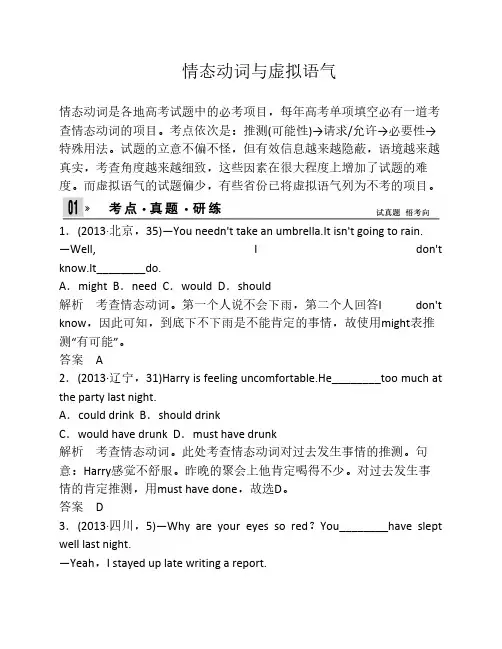
情态动词与虚拟语气情态动词是各地高考试题中的必考项目,每年高考单项填空必有一道考查情态动词的项目。
考点依次是:推测(可能性)→请求/允许→必要性→特殊用法。
试题的立意不偏不怪,但有效信息越来越隐蔽,语境越来越真实,考查角度越来越细致,这些因素在很大程度上增加了试题的难度。
而虚拟语气的试题偏少,有些省份已将虚拟语气列为不考的项目。
1.(2013·北京,35)—You needn't take an umbrella.It isn't going to rain.—Well, I don't know.It________do. A.might B.need C.would D.should解析 考查情态动词。
第一个人说不会下雨,第二个人回答I don't know,因此可知,到底下不下雨是不能肯定的事情,故使用might表推测“有可能”。
答案 A2.(2013·辽宁,31)Harry is feeling uncomfortable.He________too much at the party last night.A.could drink B.should drinkC.would have drunk D.must have drunk解析 考查情态动词。
此处考查情态动词对过去发生事情的推测。
句意:Harry感觉不舒服。
昨晚的聚会上他肯定喝得不少。
对过去发生事情的肯定推测,用must have done,故选D。
答案 D3.(2013·四川,5)—Why are your eyes so red?You________have slept well last night.—Yeah,I stayed up late writing a report.A.can't B.mustn't C.needn't D.won't解析 考查情态动词。
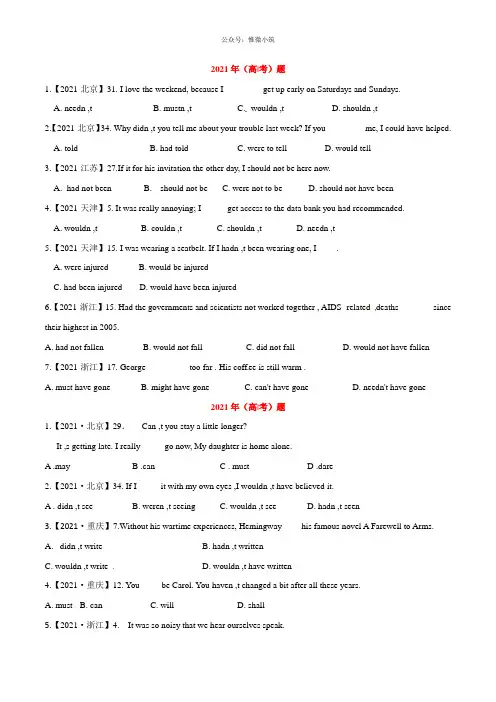
2021年(高|考)题1.【2021·北京】31. I love the weekend, because I ________ get up early on Saturdays and Sundays.A. needn ,tB. mustn ,tC.wouldn ,tD. shouldn ,t2.【2021·北京】34. Why didn ,t you tell me about your trouble last week? If you ________ me, I could have helped.A. toldB. had toldC. were to tellD. would tell3.【2021·江苏】27.If it for his invitation the other day, I should not be here now.A. had not beenB. should not beC. were not to beD. should not have been4.【2021·天津】5. It was really annoying; I _____ get access to the data bank you had recommended.A. wouldn ,tB. couldn ,tC. shouldn ,tD. needn ,t5.【2021·天津】15. I was wearing a seatbelt. If I hadn ,t been wearing one, I ____.A. were injuredB. would be injuredC. had been injuredD. would have been injured6.【2021·浙江】15. Had the governments and scientists not worked together , AIDS -related deaths _______ since their highest in 2005.A. had not fallenB. would not fallC. did not fallD. would not have fallen7.【2021·浙江】17. George _________ too far . His coff ee is still warm .A. must have goneB. might have goneC. can't have goneD. needn't have gone2021年(高|考)题1.【2021·北京】29.-Can ,t you stay a little longer?-It ,s getting late. I really _____go now, My daughter is home alone.A .mayB .canC . mustD .dare2.【2021·北京】34. If I _____it with my own eyes ,I wouldn ,t have believed it.A . didn ,t see B. weren ,t seeing C. wouldn ,t see D. hadn ,t seen3.【2021·重庆】7.Without his wartime experiences, Hemingway____ his famous novel A Farewell to Arms.A.didn ,t writeB. hadn ,t writtenC. wouldn ,t writeD. wouldn ,t have written4.【2021·重庆】12. You ____ be Carol. You haven ,t changed a bit after all these years.A. mustB. canC. willD. shall5.【2021·浙江】4. It was so noisy that we hear ourselves speak.A. couldn ,tB. shouldn ,tC. mustn ,t D needn ,t6.【2021·天津】7. I ______ have worried before I came to the new school, for my classmates here are very friendly to me.7.【2021·天津】13. I wish I ______ at my sister ,s weddin g last Tuesday, but I was on a business trip in New York then.A. will beB. would beC. have beenD. had been8.【2021·四川】2.You _____be careful with the camera. It costs!A .must B. may C. can D. will9.【2021·陕西】21. You feel all the training a waste of time, but I ,m a hundred percent sure later you ,ll be grateful you did it.A. shouldB. needC. shallD. may10.【2021·陕西】23.Ellen is a fantastic dancer. I wish I as well as her.A. danceB. will danceC. had dancedD. danced11.【2021·福建】27. -Sorry, Mum! I failed the job interview again.-Oh, it's too bad. You _________ have made full preparations.A.mustB. canC. wouldD. should12.【2021·江苏】28. It might have saved me some trouble ______ the schedule.A. did I knowB. have I knownC. do I knowD. had I knownA. hadB. had hadC. would haveD. would havehad专题06情态动词和虚拟语气1.【2021·全国大纲卷】30.Although you ______ find bargains in London, its not generally a cheap place to shop.A. shouldB. needC. mustD. can2.【2021·重庆卷】3. I ,ve ordered some pizza, so we _______ worry about cooking when we get home tired.A. can ,tB. dare notC. needn ,tD. may not3.【2021·重庆卷】10. - - - I spent two weeks in London last summer.- - - Then you must have visited the British Museum during your stay, _______ you?A. mustn ,tB. haven ,tC. didn ,tD. hadn ,tA. had doneB. have doneC. didD. am doing5.【2021·北京卷】34.We __________ back in the hotel now if you didn ,t lose the map.A. areB. wereC. will beD. would be6.【2021·北京卷】_______ I have a word with you? It won ,t take long.A. CanB. MustC. ShallD. Should7.【2021·江西卷】30. Life is unpredictable; even the poorest __become the richest.A. shallB. mustC. needD. mightA. mightB. mustC. wouldD. should9.【2021·福建卷】32.no modern telecommunications, we would have to wait for weeks to get news from around the world.there are D.If there have been10.【2021·江苏卷】31. It was sad to me that they, so poor themselves, ________ bring me food.A. mightB. wouldC. shouldD. could11.【2021·陕西卷】25. My book, The House of Hales, is missing. Who ________ have taken it?A. needB. mustC. shouldD. could12.【2021·安徽卷】30.People are recycling many things which they away in the past.A. had thrownB. will be throwingC. were throwingD. would have thrown13.【2021·湖南卷】If Mr. Dewey _____ present, he would have offered any possible assistance tothepeople there.A. wereB. had beenC. should beD. was14.【2021·湖南卷】25. - I ,ve prepared all kinds of food for the picnic.-Do you mean we_____ bring anything with us?A. can ,tB. mustn ,tC.shan ,tD. needn't15.【2021·浙江卷】16.They were abroad during the months when we were carrying out the investigati on, or they _____ toour help.A. would have comeB. could comeC. have comeD. had come2021年(高|考)英语试题分类汇编1.【2021浙江】I ________ myself more -it was a perfect day.C. wouldn ,t have enjoyedD. c ouldn ,t have enjoyed2.[2021·陕西卷]The childrenlost in the woods; otherwise, they would have been at the lakeside camp as scheduled.A. must have gotB. must getC. should have gotD. should get3.[2021·重庆卷] -It rained cats and dogs this morning.I'm glad we took an umbrella.-Yeah, we would h ave got wet all over if we ________.A.hadn't B.haven't C.didn't D.don't4.[2021·重庆卷] -What are you doing this Saturday?-I'm not sure, but I ________ go to the Rolling Stones concert.A.must B.would C.should D.might5. [2021·天津卷] No one ________ be more generous; he has a heart of gold.A. couldB. must C.dare D.need6. [2021·课标全国卷Ⅱ] Since nobody gave him any help, he ________ have done the research on his own.A. canB. mustC. wouldD. need7. [2021·江西卷] 29 When I was a child, I ________ watch TV whenever I wanted to.A. shouldB. couldC. mustD. need8.[2021·四川卷] -Why are your eyes so red? You ________ have slept well last night.-Yeah, I stayed up late writing a report.A. can'tB. mustn'tC. needn'tD. won't9.[2021·湖南卷] He ________ sleep, although he tried to, when he got on such a hunt for an idea until he had caught it.A. wouldn'tB. shouldn'tC. couldn'tD. mustn't10. [2021·江苏] I should not have laughed if I ________ you were serious.A.thought B.would think C.had thought D.have thought11. [2021·福建卷] 30 -Do you think George has passed the driving test?-No. If so, he ________his car to our college yesterday.A. would driveB. droveC. would have drivenD. had driven12. [2021·北京卷] If we ________ a table earlier, we wouldn't be standing here in a queue.A. have bookedB. bookedC. bookD. had booked13. [2021·北京卷] 35 -You needn't take an umbrella. It isn't going to rain.-Well, I don't know. It ________do.A. mightB. needC. wouldD. should14. [2021·安徽卷] It ________ be the vocabulary that caused you the problem in the exercise because you knowa lot of words.A.may B.couldn't C.should D.needn't15. [2021·安徽卷] I ________ to my cousin's birthday party last night, but I was not available.A.w ent B.had gone C.would go D.would have gone16. [2021·辽宁卷] Harry is feeling uncomfortable.He ________ too much at he party last night.A.could drink B.should drink C.would have drunk D.must have drunk学科网(高|考)一轮复习微课视频观看地址:。
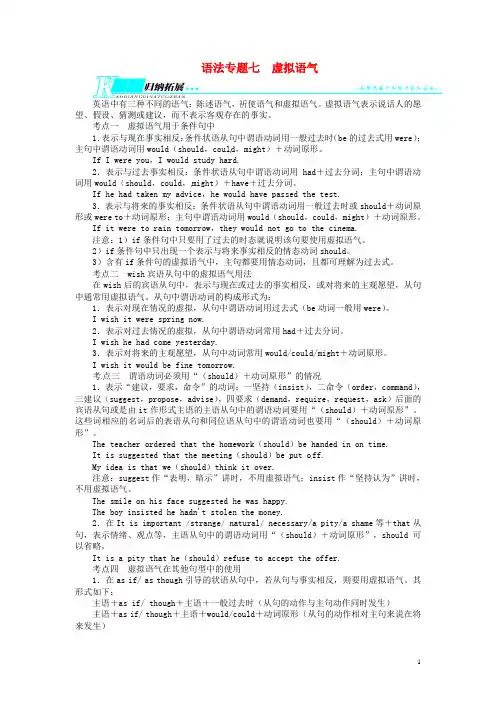
语法专题七虚拟语气英语中有三种不同的语气:陈述语气,祈使语气和虚拟语气。
虚拟语气表示说话人的愿望、假设、猜测或建议,而不表示客观存在的事实。
考点一虚拟语气用于条件句中1.表示与现在事实相反:条件状语从句中谓语动词用一般过去时(be的过去式用were);主句中谓语动词用would(should,could,might)+动词原形。
If I were you,I would study hard.2.表示与过去事实相反:条件状语从句中谓语动词用had+过去分词;主句中谓语动词用would(should,could,might)+have+过去分词。
If he had taken my advice,he would have passed the test.3.表示与将来的事实相反:条件状语从句中谓语动词用一般过去时或should+动词原形或were to+动词原形;主句中谓语动词用would(should,could,might)+动词原形。
If it were to rain tomorrow,they would not go to the cinema.注意:1)if条件句中只要用了过去的时态就说明该句要使用虚拟语气。
2)if条件句中只出现一个表示与将来事实相反的情态动词should。
3)含有if条件句的虚拟语气中,主句都要用情态动词,且都可理解为过去式。
考点二wish宾语从句中的虚拟语气用法在wish后的宾语从句中,表示与现在或过去的事实相反,或对将来的主观愿望,从句中通常用虚拟语气。
从句中谓语动词的构成形式为:1.表示对现在情况的虚拟,从句中谓语动词用过去式(be动词一般用were)。
I wish it were spring now.2.表示对过去情况的虚拟,从句中谓语动词常用had+过去分词。
I wish he had come yesterday.3.表示对将来的主观愿望,从句中动词常用would/could/might+动词原形。
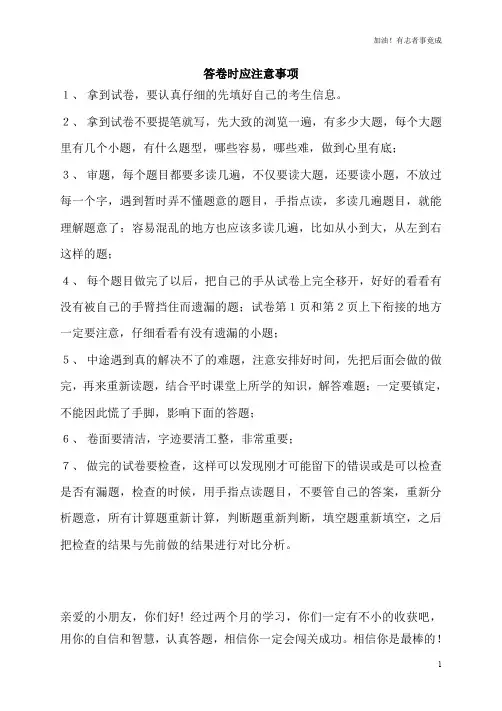
加油!有志者事竟成答卷时应注意事项1、拿到试卷,要认真仔细的先填好自己的考生信息。
2、拿到试卷不要提笔就写,先大致的浏览一遍,有多少大题,每个大题里有几个小题,有什么题型,哪些容易,哪些难,做到心里有底;3、审题,每个题目都要多读几遍,不仅要读大题,还要读小题,不放过每一个字,遇到暂时弄不懂题意的题目,手指点读,多读几遍题目,就能理解题意了;容易混乱的地方也应该多读几遍,比如从小到大,从左到右这样的题;4、每个题目做完了以后,把自己的手从试卷上完全移开,好好的看看有没有被自己的手臂挡住而遗漏的题;试卷第1页和第2页上下衔接的地方一定要注意,仔细看看有没有遗漏的小题;5、中途遇到真的解决不了的难题,注意安排好时间,先把后面会做的做完,再来重新读题,结合平时课堂上所学的知识,解答难题;一定要镇定,不能因此慌了手脚,影响下面的答题;6、卷面要清洁,字迹要清工整,非常重要;7、做完的试卷要检查,这样可以发现刚才可能留下的错误或是可以检查是否有漏题,检查的时候,用手指点读题目,不要管自己的答案,重新分析题意,所有计算题重新计算,判断题重新判断,填空题重新填空,之后把检查的结果与先前做的结果进行对比分析。
亲爱的小朋友,你们好! 经过两个月的学习,你们一定有不小的收获吧,用你的自信和智慧,认真答题,相信你一定会闯关成功。
相信你是最棒的!1专题07情态动词和虚拟语气2023年2022-2021年1.【2021年天津卷第一次】It used to be that you___drive for miles here without seeing another person,but now there are houses and people everywhere.A.need B.should C.could D.must【答案】C【详解】考查情态动词。
句意:以前你可能在这里开了几英里,都没见过别人,但现在到处都是房子和人。
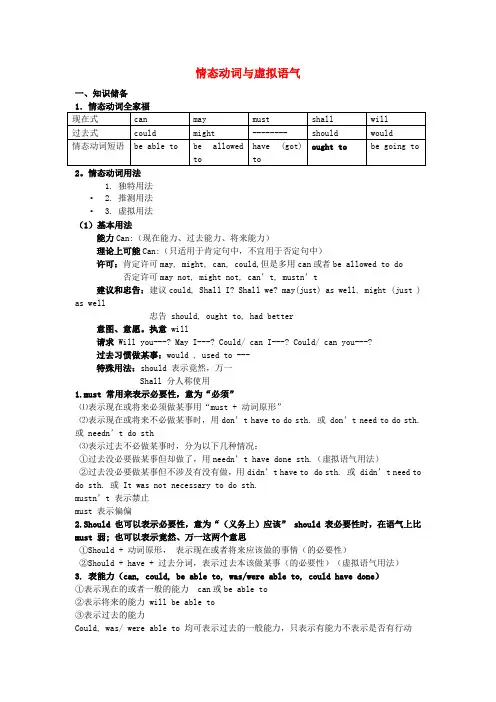
情态动词与虚拟语气一、知识储备2。
情态动词用法1. 独特用法• 2. 推测用法• 3. 虚拟用法(1)基本用法能力Can:(现在能力、过去能力、将来能力)理论上可能Can:(只适用于肯定句中,不宜用于否定句中)许可:肯定许可may, might, can, could,但是多用can或者be allowed to do 否定许可may not, might not, can’t, mustn’t建议和忠告:建议could, Shall I? Shall we? may(just) as well, might (just ) as well忠告 should, ought to, had better意图、意愿。
执意will请求Will you---? May I---? Could/ can I---? Could/ can you---?过去习惯做某事:would , used to ---特殊用法:should 表示竟然,万一Shall 分人称使用1.must 常用来表示必要性,意为“必须”⑴表示现在或将来必须做某事用“must + 动词原形”⑵表示现在或将来不必做某事时,用don’t have to do sth. 或 don’t need to do sth. 或 needn’t do sth⑶表示过去不必做某事时,分为以下几种情况:①过去没必要做某事但却做了,用needn’t have done sth.(虚拟语气用法)②过去没必要做某事但不涉及有没有做,用didn’t have to do sth. 或 didn’t need to do sth. 或 It was not necessary to do sth.mustn’t 表示禁止must 表示偏偏2.Should 也可以表示必要性,意为“(义务上)应该” should 表必要性时,在语气上比must 弱; 也可以表示竟然、万一这两个意思①Should + 动词原形,表示现在或者将来应该做的事情(的必要性)②Should + have + 过去分词,表示过去本该做某事(的必要性)(虚拟语气用法)3. 表能力(can, could, be able to, was/were able to, could have done)①表示现在的或者一般的能力 can或be able to②表示将来的能力 will be able to③表示过去的能力Could, was/ were able to 均可表示过去的一般能力,只表示有能力不表示是否有行动Was/were able to 还可强调过去有能力并且成功做了某事,相当于managed to do sth./ succeeded in doing sth.④理论上的可能性4. 其他考点(1) cannot but + do sth. 表示“不得不,只好”(2) may well 和 may as well(3)cannot(或never 等否定词)···enough/ too 表示“再······也不为过,越······越好”。
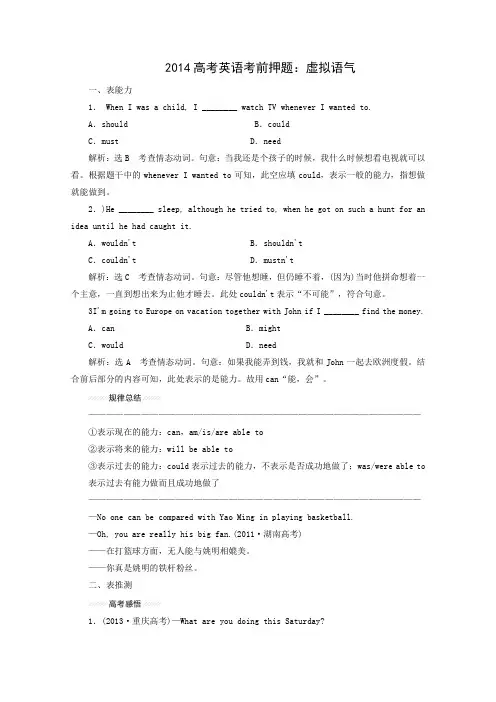
2014高考英语考前押题:虚拟语气一、表能力1. When I was a child, I ________ watch TV whenever I wanted to.A.should B.couldC.must D.need解析:选B 考查情态动词。
句意:当我还是个孩子的时候,我什么时候想看电视就可以看。
根据题干中的whenever I wanted to可知,此空应填could,表示一般的能力,指想做就能做到。
2.)He ________ sleep, although he tried to, when he got on such a hunt for an idea until he had caught it.A.wouldn't B.shouldn'tC.couldn't D.mustn't解析:选C 考查情态动词。
句意:尽管他想睡,但仍睡不着,(因为)当时他拼命想着一个主意,一直到想出来为止他才睡去。
此处couldn't表示“不可能”,符合句意。
3I'm going to Europe on vacation together with John if I ________ find the money.A.can B.mightC.would D.need解析:选A 考查情态动词。
句意:如果我能弄到钱,我就和John一起去欧洲度假。
结合前后部分的内容可知,此处表示的是能力。
故用can“能,会”。
——————————————————————————————————————①表示现在的能力:can,am/is/are able to②表示将来的能力:will be able to③表示过去的能力:could表示过去的能力,不表示是否成功地做了;was/were able to表示过去有能力做而且成功地做了———————————————————————————————————————No one can be compared with Yao Ming in playing basketball.—Oh, you are really his big fan.(2011·湖南高考)——在打篮球方面,无人能与姚明相媲美。
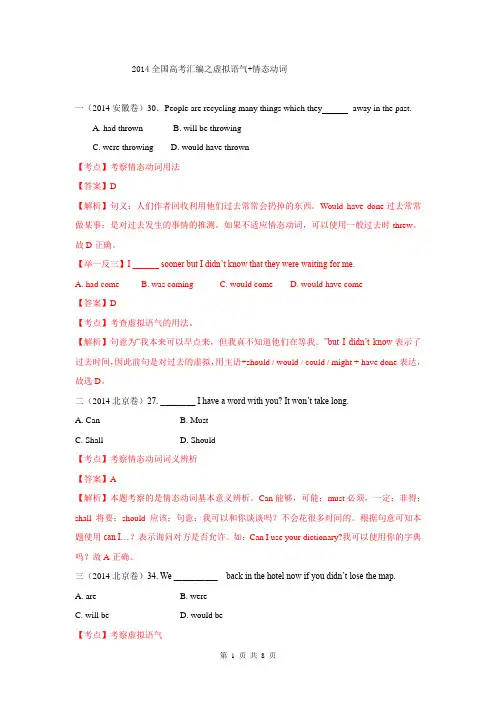
2014全国高考汇编之虚拟语气+情态动词一(2014安徽卷)30.People are recycling many things which they away in the past.A. had thrownB. will be throwingC. were throwingD. would have thrown【考点】考察情态动词用法【答案】D【解析】句义:人们作者回收利用他们过去常常会扔掉的东西。
Would have done过去常常做某事;是对过去发生的事情的推测。
如果不适应情态动词,可以使用一般过去时threw。
故D正确。
【举一反三】I ______ sooner but I didn’t know that they were waiting for me.A. had comeB. was comingC. would comeD. would have come【答案】D【考点】考查虚拟语气的用法。
【解析】句意为“我本来可以早点来,但我真不知道他们在等我。
”but I didn’t know表示了过去时间,因此前句是对过去的虚拟,用主语+should / would / could / might + have done表达,故选D。
二(2014北京卷)27. ________ I have a word with you? It won’t take long.A. CanB. MustC. ShallD. Should【考点】考察情态动词词义辨析【答案】A【解析】本题考察的是情态动词基本意义辨析。
Can能够,可能;must必须,一定;非得;shall将要;should应该;句意:我可以和你谈谈吗?不会花很多时间的。
根据句意可知本题使用can I…?表示询问对方是否允许。
如:Can I use your dictionary?我可以使用你的字典吗?故A正确。
三(2014北京卷)34. We __________ back in the hotel now if you didn’t lose the map.A. areB. wereC. will beD. would be【考点】考察虚拟语气【答案】D【解析】本题考察的是if条件状语从句的虚拟语气。
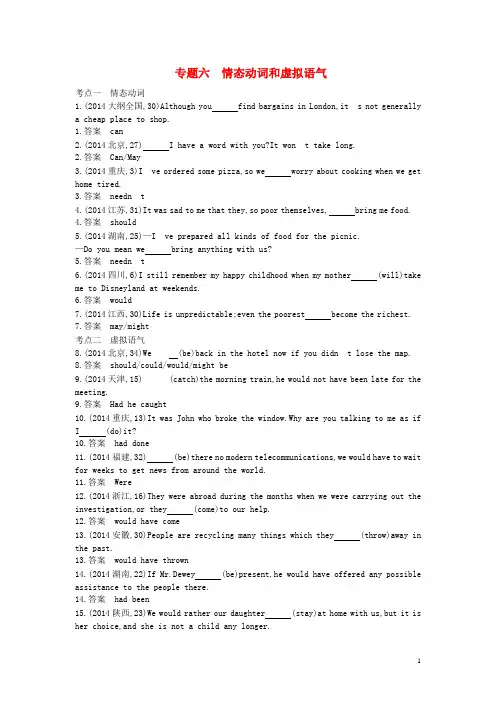
专题六情态动词和虚拟语气考点一情态动词1.(2014大纲全国,30)Although you find bargains in London,it s not generallya cheap place to shop.1.答案can2.(2014北京,27) I have a word with you?It won t take long.2.答案Can/May3.(2014重庆,3)I ve ordered some pizza,so we worry about cooking when we get home tired.3.答案needn t4.(2014江苏,31)It was sad to me that they,so poor themselves, bring me food.4.答案should5.(2014湖南,25)—I ve prepared all kinds of food for the picnic.—Do you mean we bring anything with us?5.答案needn t6.(2014四川,6)I still remember my happy childhood when my mother (will)take me to Disneyland at weekends.6.答案would7.(2014江西,30)Life is unpredictable;even the poorest become the richest.7.答案may/might考点二虚拟语气8.(2014北京,34)We (be)back in the hotel now if you didn t lose the map.8.答案should/could/would/might be9.(2014天津,15) (catch)the morning train,he would not have been late for the meeting.9.答案Had he caught10.(2014重庆,13)It was John who broke the window.Why are you talking to me as ifI (do)it?10.答案had done11.(2014福建,32) (be)there no modern telecommunications,we would have to wait for weeks to get news from around the world.11.答案Were12.(2014浙江,16)They were abroad during the months when we were carrying out the investigation,or they (come)to our help.12.答案would have come13.(2014安徽,30)People are recycling many things which they (throw)away in the past.13.答案would have thrown14.(2014湖南,22)If Mr.Dewey (be)present,he would have offered any possible assistance to the people there.14.答案had been15.(2014陕西,23)We would rather our daughter (stay)at home with us,but it is her choice,and she is not a child any longer.15.答案stayed。
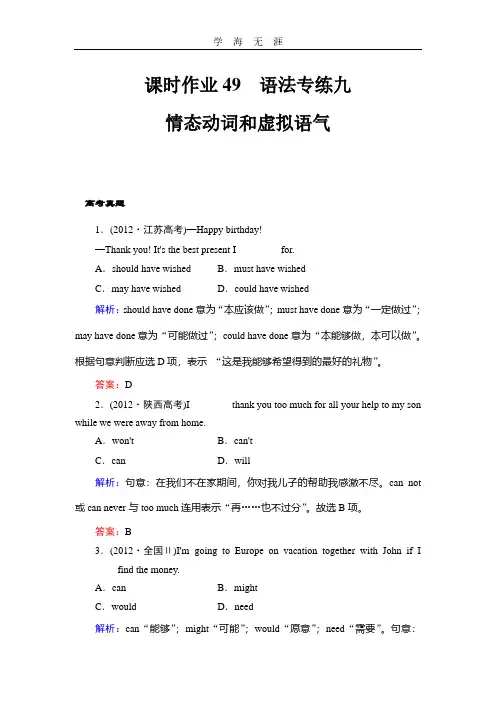
课时作业49语法专练九情态动词和虚拟语气高考真题1.(2012·江苏高考)—Happy birthday!—Thank you! It's the best present I ________ for.A.should have wished B.must have wishedC.may have wished D.could have wished解析:should have done意为“本应该做”;must have done意为“一定做过”;may have done意为“可能做过”;could have done意为“本能够做,本可以做”。
根据句意判断应选D项,表示“这是我能够希望得到的最好的礼物”。
答案:D2.(2012·陕西高考)I________ thank you too much for all your help to my son while we were away from home.A.won't B.can'tC.can D.will解析:句意:在我们不在家期间,你对我儿子的帮助我感激不尽。
can not 或can never与too much连用表示“再……也不过分”。
故选B项。
答案:B3.(2012·全国Ⅱ)I'm going to Europe on vacation together with John if I ________ find the money.A.can B.mightC.would D.need解析:can“能够”;might“可能”;would“愿意”;need“需要”。
句意:如果我能找到那笔钱,我打算和约翰一起去欧洲度假。
故选A项。
答案:A4.(2012·江苏高考)Days later, my brother called to say he was all right, but ________ say where he was.A.mustn't B.shouldn'tC.wouldn't D.mightn't解析:mustn't意为“禁止,绝对不可”;shouldn't意为“不应该”;wouldn't 意为“不愿意,不想”;mightn't意为“可能不,也许不”。
情态动词与虚拟语气(2014安徽卷)30.People are recycling many things which they______ away in the past.A. had thrownB. will be throwingC. were throwingD. would have thrown 【答案】D【解析】考查情态动词。
句意:人们在循环利用他们过去常常会扔掉的东西。
Would have done 表示对过去发生的事情的推测。
根据句意可知D正确。
(2014北京卷)27. ______ I have a word with you? It won’t take long.A. CanB. MustC. ShallD. Should【答案】A【解析】考查情态动词。
句意:我可以和你谈谈吗?用不了多少时间。
Can意为“可以”,表示请求、要求、建议等:;must意为“必须,一定”;shall意为“应,会,将,必须”;should 意为“应该”。
根据句意可知,空格can I…?表示征求许可。
故A正确。
(2014北京卷)34. We ______ back in the hotel now if you didn’t lose the map.A. areB. wereC. will beD. would be【答案】D【解析】考查虚拟语气。
句意:如果你没丢失地图,现在我们就会在宾馆里了。
If引导的条件状语从句中,如果表示与现在事实相反时,条件句中的谓语动词用“一般过去时/were”,主句使用“情态动词+动词原形”。
根据句意可知,题中所述内容与现在事实相反。
故D正确。
(2014湖南卷)22. If Mr. Dewey ______ present, he would have offered any possible assistance to the people there.A. wereB. had been G. should be D. was【答案】B【解析】考查虚拟语气。
2014高考英语语法专项训练(8)及答案(解析)--虚拟语气虚拟语气一、知识储备1。
虚拟语气在非真实条件句中虚拟条件句主句与现在事实相反的假设If + 主语+动词的过去式(be动词用were)主语+would/should/could/might+动词原形与过去事实相反的假设If + 主语+had+过去分词主语+would/should/could/might+ have+过去分词与将来事实相反的假设①If + 主语+动词的过去式②If + 主语+wereto+动词原形③If + 主语+should+动词原词主语+would/should/could/might+动词原形⑴当条件状语从句表示的行为和主句表示的行为所发生的时间不一致时,被称为“错综时间条件句”,动词的形式要根据它所表示的时间做出相应的调整⑵if 条件句在条件句中可省略if, 把were,had,should 提到句首,变为倒装句式.若省略的条件句中的谓语动词是否定形式时,不能用动词的缩略形式。
⑶用介词短语代替条件状语从句。
常用介词有with, without,but for。
⑷含蓄条件句为了表达需要,在虚拟语气中并不总是出现if 引导的条件句,而通过其他手段来代替条件句.比如说用otherwise, or,but,even if,even though, 独立主格,定语从句。
2。
虚拟语气在名词性从句中的应用⑴用于宾语从句中①Wish 后面的宾语从句一般用虚拟语气,表示一种不可能实现的愿望。
其谓语动词构成形式是过去时(宾语从句动作与wish 同时)过去完成时(宾语从句动作先于wish)Could/ would/might + 动词原形,即过去将来时(宾语从句动作后于wish)此外If only +句子= How I wish that + 句子②用于表示建议、愿望、命令等词后的宾语从句,常见动词有:demand,order, require, insist, suggest, propose,advise 等。
专题限时训练(十) [情态动词与虚拟语气](限时:10分钟)1.Time ________ heal a broken heart. After five years,Steve seems to have got over the sorrow of losing his son.A.should B.wouldC.shall D.can2.—Can you come to attend our party tonight?—Sorry, but I do wi sh I ________.A.had B.c anC.will D.could3.—We________the game. You spoiled the chance by missing the ball!—I'm terribly sorry!A.could win B.would winC.could have won D.must have won4.There was something wrong with the network, or the email________ earlier.A.could have been sent B.might be sentC.need have been sent D.must be sent5.We've had a good start, but next, more work needs ________to achieve the final success.A.to be done B.doC.being done D.to do6.For those of you who ________ a few very popular articles that came out last week, check out this mail.A.may miss B.must have missedC. may have missed D.would have missed7.________ your letter, I would have set off two days ago.A.If I could have received B.Should I receiveC.If I received D.Had I received8.When I lived with my roommate s in the university, we ________ often talk into the night.A.might B.couldC.should D.would9.—It is unbelievable that John should have fought with the policeman.—Well, if one ________ ask for trouble, it just can't be helped.A.will B.mustC.should D.dare10. Don't be angry with us. We ________with you together, but we were busy with our final reports when called in.A.would eat out B.must have eaten outC.should eat out D.could have eaten out11. It ________ rain in the desert sometimes, but you can't depend on it.A.will B.shallC.must D.can12.—Did you make it at last?—Yes. But for your help, it ________a serious loss.A.would cause B. must have causedC. would have causedD. may cause13. Sorry, I am too busy now. If I ________ time, I would certainly go for an outing with you.A.have had B.had hadC.have D.had14.—Will you stay for the dinner?—Sorry,________. The cookers I bought online will be sent to my house this afternoon.A.I can't B.I mustn'tC.I needn't D.I shouldn't15.I felt surprised that anyone of his intelligence ________ such an easy test.A.might have failed B.could have failedC.should have failed D.must have failed16.—Mary broke up with me!—You________have forgotten about the Valentine's Day.A.shouldn't B.couldn'tC.needn't D.mustn't17.—It ________ be only two days before I have the job interview.—________ you succeed.A.must; May B.must; ShouldC.will; May D.will; Should18.I think that's unlikely to happen, but if that ________ occur, both America's and China's interest would be severely damaged.A.should B.couldC.would D.might19.The official made the demand that the soldiers ________ at once________the battlefront.A.leave; for B.to leave; toC.left; to D.to be left; for20.—Excuse me, visiting hours are over.It's time for you to leave.—I'm sorry. I didn't know the time or I ________ earlier.A.will leave B.would leaveC.had left D.would have left专题限时训练(十)1.D 考查情态动词。
2014年高考英语二轮复习单项选择拉分题特训:情态动词和虚拟语气1. —A stranger has come to see you. Shall I bring him in?—I would rather he tomorrow. I'm terribly busy now.A. will comeB. cameC. would comeD. had come2. She didn’t come to the party last Sunday. _______, she must have made the party more exciting.A. If she cameB. Would she comeC. Had she comeD. Did she come3.—Who has made a mess inmy room?—Who else _______ have done it but your naughty son?A.wouldB.couldC.shouldD. must4. —Mary didn't turn up last time, did she?—No, she ___. We had changed our plan.A. didn't need to comeB. needn't have comeC. shouldn't have comeD. needn't have to come5. Holiday shopping ___be a tiring experience. There are so many places to visit and choices to make.A. canB. mayC. shallD. will6. —It’s ten years since I met you last time. I ________ you at all.—I wouldn’t have, either, if someone ________ you by name.A. didn’t recognize; didn’t callB. haven’t recognized; didn’t callC. can’t recognize; had calledD. didn’t recognize; hadn’t called7. —Why hasn’t Jack come back yet? _______anything have happened to him?—I’m not sure, but I guess something_______.A. May; must haveB. Can; may haveC. Must; mayD. Should; might have8. He_______writing the paper now. He hadn’t written a single word when I left him ten minutes ago.A. shouldn’t beB. can’t have finishedC. can’t beD. mustn’t have finished9. His pale face suggested that he_______really frightened by the accident and we suggestedhe_______a good rest.A. be; hadB. should be; hasC. was; haveD. had been; should have10. —I saw her in the office this morning.—Really?She_______back to work without the doc tor’s permission.A. couldn’t have goneB. needed not to goC. didn’t need to goD. shouldn’t have gone11. —Why did Simon get home so late?—He was so drunk that he_______his way back.A. might not findB. might not have foundC. co uldn’t findD. couldn’t have found12. —“Crash diets” make us lose weight fast and I am all into that.—But it_______better to work out.A. hadB. would beC. wouldn’t have beenD. must have been13. —Do you believe Cecilia has good table manners?—Oh,no. As is known to us all,she_______comb her hair at the table,even though she knows we don’t like it.A. willB. mayC. has got toD. shall14. The law keeps teenagers from getting cigarettes that_______ more freely available.A. haven’t otherwise beenB. had otherwise beenC. would otherwise have beenD. wouldn’t otherwise be15. Belinda_______be allowed to play with that toy all the time just because she’s the eldest.A. wouldn’tB. needn’tC. mustn’tD.daren’t16. We played really poorly in the first half. We_______,however,feel that we were very lucky indeed. After all,the score is tied.A. wouldB. couldC. shouldD. might17. A judge has ruled the strike is illegal,and ordered that the union_______$2 million a day.A. was finedB. be finedC. is finedD. would be fined18. I_______here earlier. I never thought the car would break down halfway.A. could comeB. should comeC. would have comeD. may have come19. Many students will take part in the school sports meeting this week,so she suggested that the class meeting_______held on Saturday.A. not beB. not to beC. be notD. be not to20. Luckily the man missed the high- speed train to Wenzhou, or he_____have been killed in the accident.A. mustB. wouldC. shouldD. might21. I got close enough to hear them speaking Chinese, and I said “Ni Hao”, just as I_____do in China.A. mustB. mightC. canD. should22. One of our rules is that every student_____ wear school uniform while at school.A. mightB. couldC. shallD. will23. —Happy birthday!—Thank you! It’s the best present I______for.A. should have wishedB. must have wishedC. may have wishedD. could have wished24. Days later, my brother called to say he was all right, but______say where he was.A. mustn’tB. shouldn’tC. wouldn’tD. mightn’t25. We______the difficulty together, but why didn’t you tell me?A. should faceB. might faceC. could have facedD. must have faced26. I_____ thank you too much for all your help to my son while we were away from home.A. won’tB. can’tC. canD. wil27.—Did you meet with Mr. Jackson?—I had come here a little earlier.A. If onlyB. Only ifC. But forD. For fear28. Terry threw out his arm just in time to stop you falling down the stairs. Otherwise, I_____you black and blue all over now.A.see B.will see C.would see D.would have seen29. Before space travel, an astronaut must know_____it might feel like to stay in an imaginary environment.A.when B.what C.how D.that30. ______for the free vegetables, women workers would not have gone to the supermarket so often.A.Ifit is not B.Were it not C.Had it not been D.If they were not31.(The policeman declared that the blow on the boy’s head _____from behind.A.should have been madeB.must have been madeC.would have been madeD.could have been made32. If the wound______become swollen, do not hesitate to call me.A.shallB. mustC. shouldD. would33. I actually believe that we _____ in Xi’an now if you hadn’t been caught drunk driving last month.A. would beB. would have beenC. wereD.had been34. Thank you for all your hard work last week.I don’t think we_______it without you.A. can manageB. could have managedC. could manageD. can have managed35. But for their help, we_________ the program in time.A. can not finishB. will not finishC. had not finishedD. could not have finished36. But for the help of my English teacher, I_______the first prize in the English Writing Competition.A. would not winB. would not have wonC. would winD. would have won37. This printer is of good quality. If it_______break down within the first year, we would repair it at our expense.A. wouldB. shouldC. couldD. might38.He did not regret saying what he did but felt that he_______it differently.A. could expressB. would expressC. could have expressedD. must have expressed39. George is going to talk about the geography of his country, but I’d rather he_______more on its culture.A. focusB. focusedC. would focusD. had focused40. Had I known about this computer program, a huge amount of time and energy_______.A. would have been savedB. had been savedC. will be savedD. was saved41. We_______John’s name on the race list yesterday but for his recent injury.A. will putB. will have putC. would putD. would have put42. I_______through that bitter period without your generous help.A. couldn’t have goneB. didn’t goC. wouldn’t goD. hadn't gone43. I_______sooner but I didn’t know that they were waiting for me.A. had comeB. was comingC. would comeD. would have come44. —Pity you missed the lecture on nuclear pollution.—I_______it, but I was busy preparing for a job interview.A. attendedB. had attendedC. would attendD. would have attended45. Maybe if I_______science, and not literature then, I would be able to give you more help.A. studiedB. would studyC. had studiedD. was studying46. —Where is my dictionary? I remember I put it here yesterday.—You_______it in the wrong place.A. must putB. should have putC. might putD. might have put47. The teacher_______have thought Johnson was worth it or shewouldn’t have wasted time on him, I suppose.A. shouldB. canC. wouldD. must48. She_______have left school, for her bike is still here.A. can’tB. wouldn’tC. shouldn’tD. needn’t49. Jack described his father, who_______a brave boy many years ago, as a strong-willed man.A. would beB. would have beenC. must beD. must have been50. —Good morning. I’ve got an appointment with Miss Smith in the Personnel Department.—Ah, good morning. You_______be Mrs. Peters.A. mightB. mustC. wouldD. can51. It_______be the postman at the door. It’s only six o’clock.A. mustn’tB. can’tC. won’tD. needn’t52. —I left my handbag on the train, but luckily someone gave it to a railway official.—How unbelievable to get it back! I mean, someone_______it.A. will have stolenB. might have stolenC. should have stolenD. must have stolen53. The biggest problem for most plants, which_______just get upand run away when threatened, is that animals like to eat them.A. shan’tB. can’tC. needn’tD. mustn’t54. —What does the sign over there read?—"No person_______smoke or carry a lighted cigarette, cigar or pipe in this area."A. willB. mayC. shallD. must55. —Turn off the TV, Jack._______your homework now?—Mum, just ten more minutes, please.A. Should you be doingB. Shouldn’t you be doingC. Couldn’t you b e doingD. Will you be doing56. —What do you think we can do for our aged parents?—You_______do anything except to be with them and be yourself.A. don't have toB. oughtn't toC. mustn'tD. can't57. Peter_______be really difficult at times ev en though he’s anice person in general.A. shallB. shouldC. canD. must58. It is usually warm in my hometown in March, but it___________be rather cold sometimes.A. mustB. canC. shouldD. would59. One of the few things you_______say about English people with certainty is that they talk a lot about the weather.A. needB. mustC. shouldD. can60.Just be patient. You_______expect the world to change so soon.A. can'tB. needn'tC. may notD. will not参考答案1. B2. C3.B4.A5. A6. D7. B8. B9. C10. D11. C 12. B13. A14. C15. C16. C17. B18. C19. A20.D21.B 22.C23.D24.C25.C26.B27.A28.C29.B30.C31.B 32.C 33.A34.B35.D36.B37.B38.C39.B40.A41.D42.A 43.D44.D45.C46.D47.D48.A49.D50.B 51.B52.B53.B 54.C55.B56.A57.C58.B59.D60.A。
1.【2014届广西桂林中学2月考】31. — Thank God! The accident was avoided after all.—That was lucky, but ten inches nearer the two cars _________?A. was destroyedB. would be destroyedC. would have been destroyedD. had been destroyed2.【2014届重庆南开中学月考】30.You fool! You __________ all the people in the car yesterday if it had not been for me.You were so drunk while driving!A.could kill B.might have killedC.had killed D.should have killed3.【2014届重庆南开中学月考】24.China’s word,tuhao,which caught the attention of the dictionary’s editing team,__________ be in next year’s Oxford English Dictionary.A.must B.need C.dare D.may考点:考查情态动词4. 【2014届浙江省六校联考】15. —How’s your tour around the North Lake? Is it beautiful?— It ______ be, but it is now heavily polluted.A. willB. wouldC. shouldD. must5.【2014届福建省福州八中第六次质检】34. —Do you think George has passed the driving test?—No. If so, he ______ his car to our college yesterday.A. would driveB. droveC. would have drivenD. had driven6.【2014届江苏省苏州市调研】31.We got in my father's car and headed straight home and__________,I surely would have been stuck in the station for several days.A. had I notB. did I notC. if I didn'tD. if I had7.【2014届江苏省苏州市调研】27. China Hengda_well have won the football match, but I don't know because I wasn't there.A. couldB. mayC. should .D. must8.【2014届甘肃省河西五市普通中学联考】14.I would rather ________ to work after my graduation, but my father would rather I ________ abroad for further education.A. go ;had goneB. go; wentC. went ; went D . went ; will go9.【2014届福建省漳州七校第二次联考】28. —I heard the phone ringing in the office next door.—You _______ it. They haven’t got a phone yet.A.co uldn’t hear B.couldn’t have heard C.didn’t hear D.wouldn’t have heard10.【2014届湖南省十三校第一次联考】22.Growing up _____ be difficult, for you willcome across many things that confuse you.A.can B.should C.must D.shall【答案】A11.【2014届陕西省咸阳市高考模拟】20. I ______ Peter with his work, but I had a lot of things to do myself.A. must have helpedB. should have helpedC. needn’t have helpedD. can’t have helped12.【2014届四川省成都七中二诊】3. I’m very hungry. Get me somethin g to eat; anything ________ do.A. willB. shouldC. mustD. can13.【2014届甘肃省武威市凉州区一诊】3. We have bought so much food now that Suzie won’t be with us for dinner.A. may notB. mustn’t C.can’t D.needn’t考点: 考查情态动词的用法。
2014全国高考汇编之虚拟语气+情态动词一(2014安徽卷)30.People are recycling many things which they away in the past.A. had thrownB. will be throwingC. were throwingD. would have thrown【考点】考察情态动词用法【答案】D【解析】句义:人们作者回收利用他们过去常常会扔掉的东西。
Would have done过去常常做某事;是对过去发生的事情的推测。
如果不适应情态动词,可以使用一般过去时threw。
故D 正确。
【举一反三】I ______ sooner but I didn’t know that they were waiting for me.A. had comeB. was comingC. would comeD. would have come【答案】D【考点】考查虚拟语气的用法。
【解析】句意为“我本来可以早点来,但我真不知道他们在等我。
”but I didn’t know表示了过去时间,因此前句是对过去的虚拟,用主语+should / would / could / might + have done表达,故选D。
二(2014北京卷)27. ________ I have a word with you? It won’t take long.A. CanB. MustC. ShallD. Should【考点】考察情态动词词义辨析【答案】A【解析】本题考察的是情态动词基本意义辨析。
Can能够,可能;must必须,一定;非得;shall将要;should应该;句意:我可以和你谈谈吗?不会花很多时间的。
根据句意可知本题使用can I…?表示询问对方是否允许。
如:Can I use your dictionary?我可以使用你的字典吗?故A正确。
三(2014北京卷)34. We __________ back in the hotel now if you didn’t lose the map.A. areB. wereC. will beD. would be【考点】考察虚拟语气【答案】D【解析】本题考察的是if条件状语从句的虚拟语气。
表示与现在事实相反时,条件句中使用“一般过去时/were”,主句使用“情态动词+动词原形”。
句意:如果你没有把地图丢了,我们现在就会在宾馆里了。
根据从句的did可知本句是与现在事实相反,故D正确。
【试题延伸】条件句的虚拟语气是考查的重点。
如果过去事实相反,条件句中使用过去完成时,主句使用“情态动词+have done”;如果主句与现在事实相反,条件句中使用过去时,be动词使用were,主句中使用“情态动词+动词原形”;如果与将来事实相反,条件句中有三种:过去时;were to do ;should+动词原形,主句使用“情态动词+动词原形”;要特别注意如果省略了if,句子要使用部分倒装的形式,把助动词,be动词,情态动词提之主语前。
【举一反三】Grace doesn't want to move to New York because she thinks if she there, she wouldn't be able to see her parents very often.A. livesB. would liveC. having askedD. Were to live【答案】D【考点】考查情态动词。
【解析】在表示将来的情况下,主句中第一人称可用should,其他人称用would;从句中任何人称都用should,不可用would.此处were to live用于虚拟语气,表示与将来的事实相反。
四(2014大纲卷)30. Although you _____ find bargains in London, it’s not gen erallya cheap place to shop.A. shouldB. needC. mustD. can【考点】考察情态动词词义辨析【答案】D【解析】should应该,竟然;need需要;must必须,一定;非得,偏偏;can能够,可能,有时会…;句义:尽管你有时可能会在伦敦找到便宜货,但总得说来那不是一个购物的便宜的地方。
根据句义可知can表示有时可能,有时会…;故D正确。
【举一反三】It is usually warm in my hometown in March, but it be rather cold sometimes.A.mustB.canC.shouldD.would〖答案〗B〖考点〗本题考查情态动词的用法。
〖解析〗must必然, 一定;can可能;should应该;would(过去)将, 总会。
本题提供的语境是“有时可能会……”。
五(2014福建卷)32. no modern telecommunications, we would have to wait for weeks to get news from around the world.A. Were thereB. Had there been C .If there are D. If there have been 【考点】考察虚拟语气和省略【答案】A【解析】本题是一个if条件句的虚拟语气,表示与现在相反,if从句中使用“过去时/were”,主句使用“情态动词+动词原形”;在if被省略的时候,要使用部分倒装。
句义:如果没有现代的电信业,要想得到世界各地的消息,我们就不得不等几个星期。
故A正确。
六(2014湖南卷)22.If Mr. Dewey _____ present, he would have offered any possible assistance to the people there.A. wereB. had been G. should be D. was【考点】考察虚拟语气【答案】B【解析】本题考察的是条件状语从句的虚拟语气中的与过去事实相反的情况。
与过去事实相反的虚拟语气,条件状语从句要使用“过去完成时had done”,主句要使用“情态动词+have done”。
句义:如果Mr Dewey在场,他就会向那里的人提供保证。
根据本句后面主句中的would have offered说明与过去事实相反,故从句中使用过去完成时。
故B正确。
【试题延伸】if的虚拟语气非常重要,简要概括如下:1、表示与现在事实相反的情况,从句:If主语+过去时(Be动词用were);主句:主语+should/would/could/might+do:2、表示与过去事实相反的情况,从句:If主语+had+done;主句:主语+should/would/could/might+have done 3、表示对将来情况的主观推测,从句:①if+主语+were to do②if+主语+should+do ③if+主语+did(动词过去式)/were ;主句:主语+should/would/could/might+do。
【举一反三】If may car _________more reliable, I would have driven to Lhasa instead of flying last summer.A. wasB. had beenC. should beD. would be【答案】B【考点】考查虚拟语气。
【解析】根据主语的谓语动词可知题干是表示与过去事实相反的虚拟语气,从句谓语动词用had done,选B。
七(2014湖南卷)25.—I’ve prepared all kinds of food for the picnic.—Do you mean we_____ bring anything with us?A. can’tB. mustn’tC. shan’tD. needn't【考点】考察情态动词【答案】D【解析】本题考察的是情态动词意义辨析。
can’t不可能;不能;mustn’t禁止,千万不能;needn’t不必;不需要;句义:—我已经为野餐准备了各种食物。
—你是指我们不必带任何东西了?根据句义可知前者已经准备了一切食物,所以后者不需要带任何东西。
故D正确。
【举一反三】We have bought so much food now that Suzie won’t be with us for dinner.A.may not B.needn’t C.can’t D.mustn’t【答案】B【考点】考察情态动词的用法【解析】may not不可以,needn’t不需要,can't不可能, mustn't绝不可能本句句意为:既然Suzie不和我们一起吃晚饭,所以我们就不需要买这么多食物。
八(2014江苏卷)31. It was sad to me that they, so poor themselves, bring me food.A. mightB. wouldC. shouldD. could【考点】考察情态动词词义辨析【答案】C【解析】本题考察的是情态动词的特殊意义。
Might也许;would会,过去常常做某事;should 应该,竟然;could能够;句意:让我难过的是,如此贫穷的他们竟然给我带来了食物。
根据句意可知本句中的should表示“竟然”。
故C正确。
【试题延伸】在平时的学习中既要注意情态动词的基本含义,也要注意情态动词的特殊意义,如must偏偏,非得;should竟然;mustn’t禁止,千万不能;等等。
情态动词Shall用于所有人称,表示命令,警告,允诺;以及法律规定中要做的事情。
【举一反三】—It’s hard to believe that Jack ________ have fought with the policeman.—Yes. If one ________ ask for trouble, it can’t be helped.A. would; willB. must; mayC. should; mustD. need; dare【答案解析】C考查情态动词。
句意:——难以置信,杰克竟然与警察打了一架。
——是的。
如果一个人非要找麻烦,实在没法子。
句中should表示“竟然”,must表示“硬要,非要”。
九(2014江西卷)30. Life is unpredictable ; even the poorest __become the richest .A. shallB. mustC. needD. might【考点】考察情态动词词义辨析【答案】D【解析】本题考察的是情态动词辨析。